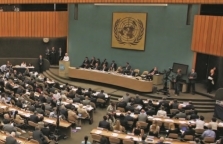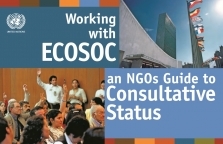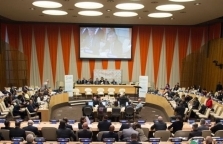Non-Governmental Organizations (NGOs) can apply for consultative status with the United Nations Economic and Social Council (ECOSOC) by 1 June 2017 in order for their applications to be considered in 2018. Organizations interested in actively engaging with the United Nations should submit their applications and required documents before the deadline. The following link provides background information, some of the benefits responsibilities, and the instructions of how to apply:
The Economic and Social Council is at the heart of the United Nations system to advance the three dimensions of sustainable development – economic, social and environmental. It is the central platform for fostering debate and innovative thinking, forging consensus on ways forward, and coordinating efforts to achieve internationally agreed goals. It is also responsible for the follow-up to major UN conferences and summits. The UN Charter established ECOSOC in 1945 as one of the six main organs of the United Nations.
ECOSOC consultative status was the first venue through which NGOs took a role in formal UN deliberations. In 1945, 41 NGOs were granted consultative status by the council; by 1992 more than 700 NGOs had attained consultative status and the number has been steadily increasing ever since with more than 4,000 organizations today.
Article 71 of the UN Charter opened the door by providing suitable arrangements for consultations with NGOs. The consultative relationship with ECOSOC is governed by ECOSOC resolution 1996/31, which outlines the eligibility requirements for consultative status, rights and obligations of NGOs in consultative status, procedures for withdrawal or suspension of consultative status, the role and functions of the ECOSOC Committee on NGOs, and the responsibilities of the United Nations Secretariat in supporting the consultative relationship. Consultative status is granted by ECOSOC upon recommendation of the Committee on NGOs, which is composed by 19 Member States.
Who is eligible for applying?
To be eligible for consultative status, an NGO must have been in existence (officially registered with the appropriate government authorities as an NGO/non-profit) for at least two years, must have an established headquarters, a democratically adopted constitution, authority to speak for its members, a representative structure, appropriate mechanisms of accountability and democratic and transparent decision-making processes. The basic resources of the organization must be derived in the main part from contributions of the national affiliates or other components or from individual members.
What are the benefits?
NGOs that are accredited with ECOSOC can participate in a number of events, including, but not limited to regular sessions of ECOSOC, its functional commissions and its other subsidiary bodies. NGOs may:
- Attend official meetings;
- Submit written statements prior to sessions;
- Make oral statements;
- Meet official government delegations and other NGO representatives;
- Organize and attend parallel events that take place during the session;
- Participate in debates, interactive dialogues, panel discussions and informal meetings.




